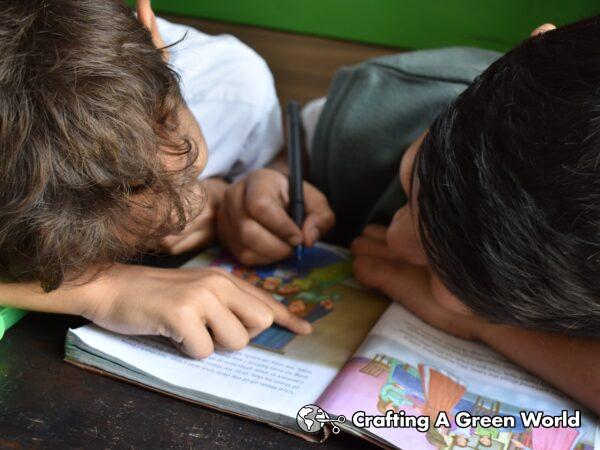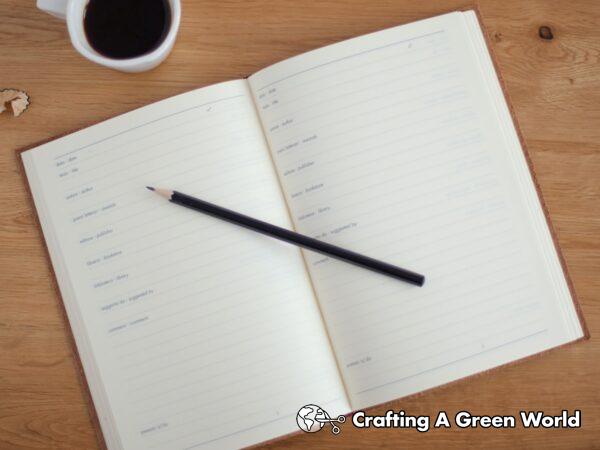Taking time to reflect and put pen to paper is a wonderful journey. Crafting a poem journal can change how you express your emotions and perceive the world around you. It’s a door to your inner thoughts, your soul’s whispers, and your heart’s silent songs.
In this article, we will bring you a range of poem journal ideas to awaken your poetic spirit. Whether you’re looking for a way to pour out your emotions, find beauty in everyday life, or simply take pleasure in the rhythmic dance of words, our compilation of inspiration sources is here to escort you.
So, prepare your journal, seek out your comfort zone, and let’s embark on this lyrical adventure together. 📝
Exploring Nature Through Poetry
Exploring nature through poetry allows one to express and channel their personal experiences with the natural world, fostering a deeper connection and appreciation for the environment. Here are 20 prompts to inspire your explorations of nature through poetry:
- Write a poem about your favorite season and why it is so special to you.
- Describe the colors and smells of a walk through a forest in a poem.
- Pen a poem about a striking natural phenomenon such as a thunderstorm or a sunset.
- Create a poem from the viewpoint of an animal or a plant.
- Write about a natural disaster and its impact on the environment.
- Converse with the wind – write a poem as if you were having a dialogue with the breeze.
- Connect the stages of life to the four seasons in a sonnet.
- Write a poem about a plant or tree from seed to adult.
- Describe in a poem the feeling of being outdoors after a long period indoors.
- Express the beauty of a commonplace natural object – a leaf, a stone, a blade of grass – in a haiku.
- Do an acrostic poem about your favorite place in nature.
- Write a poem about the struggle and beauty of a plant growing through a crack in the sidewalk.
- Write about one of the basic elements of nature – earth, wind, fire, or water.
- Write a poem about nightfall in the wilderness.
- Describe the relationship between the moon and the tides in a rhyming couplet.
- Craft an elegy to a species recently declared extinct.
- Write a poem comparing the tranquility of a meadow to the chaos of modern life.
- Use metaphors or similes to link emotions to features of the natural world.
- Write a poem about transformation in nature, such as a caterpillar evolving into a butterfly.
- Document the journey of a river from its source to the sea.
Reflections On Love
Reflections on Love in a poetry journal deepens our understanding and perspective towards the different shades of love, helping us appreciate its beauty and complexity. Here are 20 writing prompts centered around Reflections on Love:
- Write a love letter to yourself. Praise your virtues and accomplishments.
- Imagine you could talk to Love as a person. Scribble down the conversation.
- Reflect on your first experience of love. How different is it from your current understanding?
- Write about a moment of love which helped you grow as a person.
- Speak of a love you always longed for. What made it special?
- Explore a moment when love made you feel vulnerable. How did it change you?
- Write a poem on love as an unbreakable bond that endures all things.
- Reflect on a situation where love brought you pain. How did you cope with it?
- Chronicle your thoughts about the prospect of “one true love.” Is it plausible?
- Write about love as an act of courage. Delve into a time when love made you brave.
- Reflect on lost love. How does its absence shape your life today?
- Write about a time when love surprised you.
- Narrate a journey of love that took an unexpected turn. How did it affect you emotionally?
- Pen down your understanding of unconditional love.
- Write about a moment when love inspired you to become a better person.
- Chronicle unspoken love. What are its joys and sorrows?
- Think about the idea of love at first sight. Write a short verse to describe its charm.
- Express the transformative power of love.
- Write about a time when loving someone was difficult. Why was it so?
- Close your eyes and feel the love around you. What do you see, listen, or feel? Write a poem to depict this sensory experience.
Diving Into Personal Identity
Exploring personal identity through journaling allows us to understand who we are in a deeper sense, expressing these revelations creatively via poems. Below are 20 prompts you can harness to dive into your personal identity in your poem journal:
- Describe the values or beliefs that currently define your life.
- Reflect on an experience that has significantly shaped who you are today.
- Write a poem about embracing your unique quirks.
- Picture your fluent inner voice, what does it say about who you are?
- Describe the roles (like a parent, partner, friend, etc.) you take on in life and how each impacts your identity.
- Write about where you come from and how it has made an influence on your identity.
- Recall a life-changing moment and how it affected your perception of yourself.
- Craft a verse on your biggest fear and why it scares you.
- Create a poem about your greatest achievement and how it changed you.
- Describe your reflection when you look in the mirror – does it match your inner self?
- Write a poem about your future self and how you envisage your identity evolving.
- Chronicle your personal growth over the years, highlighting key moments.
- Reflect on your strengths and how they construct your self-image.
- Write a poem about your life’s most profound regret, and how it shaped you.
- Explore how your relationships define and reflect parts of your identity.
- Create a piece on your most cherished childhood memory and its impact on who you are.
- Describe an encounter or relationship that significantly challenged your self-identity.
- Write a poem about your insecurities, and how you cope with them.
- Craft verses about your dreams or ambitions, and how they resonate with your personal self.
- Reflect on a point of your life when you felt most authentically yourself, and what it tells you about your identity.
Expressing Emotions Poetically
Expressing Emotions Poetically in your journal encourages introspection and helps translate feelings into evocative language, transforming your inner experiences into tangible verses. Here are 20 writing prompts to explore expressing emotions poetically in your journal:
- Write a poem about a challenging situation you experienced recently. How did it make you feel?
- Write about a moment of joy you experienced this week. Try to convey that happiness through your words.
- Recall an instance when you felt anger or frustration. Translate that energy into a fiery, passionate poem.
- Draft lyrics for a song that expresses your current mood. Try to link the words rhythmically.
- Write a poem expressing your feelings towards someone special in your life.
- Think about a time when you felt exceptionally peaceful. Compose a tranquil, serene poem capturing that moment.
- Reflect on loneliness. Write a poem that reveals the nuances of this feeling.
- Recall a moment of surprise or disbelief. Create a poem portraying the unpredictability of life.
- Consider a moment when you felt guilty. Write a poem that shows remorse but also hope for redemption.
- Write a poem about anticipation. Capture the thrill of waiting for something you've been looking forward to.
- Capture a moment of fear in a poem. Try to convey the sense of dread and then the relief when the fear subsides.
- Write a poem about an accomplishment or victory, big or small. Channel your pride and satisfaction into your words.
- Consider a moment of grief or loss. Write a poem that serves as a cathartic release of sorrow.
- Compose a poem that draws parallels between your emotions and elements of nature.
- Write a poem about a time of transition, capturing the mix of apprehension and excitement.
- Create a poem expressing your dreams and aspirations and the emotions tied to them.
- Write a poem about a misunderstanding. Channel your feelings of confusion and resolution.
- Draft a poem about a time you felt overwhelmed. Express the chaos and how you overcame it.
- Write a poem about an emotional learning experience. Detail how it helped in your emotional growth.
- Compose a poem about how you perceive love, blending your feelings and experiences into a heartfelt piece.
Exploring Imagery In Poetry
Exploring Imagery in poetry encourages the use of detailed and vivid pictures, formed in your mind through words, to express emotions and ideas in your journaling efforts. Below are 20 prompts to guide you in incorporating imagery in your poetry journal entries.
- Describe a sunset using abstract concepts like loneliness or joy.
- Write a poem containing personified elements of weather.
- Portray a significant memory using only the four primary senses.
- Create a poem where the central imagery revolves around waterways.
- Imagine yourself as a tree. Describe the seasons changing from your point of view.
- Pen a poem that expresses an emotion using the metaphor of a journey.
- Describe a cityscape without using the words 'city', 'building', or 'street'.
- Write about an everyday object but explore it with an unusual perspective.
- Portray a tempest in a way that mirrors an internal conflict.
- Write about an interaction between two animals that mirrors human social dynamics.
- Illustrate the transition between day and night using a flower's perspective.
- Write a poem about love using only images from nature.
- Describe a heated argument using words related to cold and ice.
- Write a poem where color is the central imagery throughout.
- Use imagery related to light and shadow to portray a moral dilemma.
- Explore an emotion through the imagery of a changing landscape.
- Use the image of a mirror to illustrate self-reflection in a poem.
- Craft a poem where the imagery of motion and direction reflect life stages.
- Write a poem about loss using only imagery related to autumn.
- Use personified elements of a storm to represent an explosive situation or emotion.
The Power Of Metaphor
Emphasizing the power of metaphor within our poem journals aids in unearthing deeper connections and layers of meaning, giving our words and feelings amplified resonance. Dive into the labyrinth of metaphoric writing with these 20 prompts:
- Use a metaphor to describe an important relationship in your life.
- Write about an emotion, representing it as a weather condition.
- Craft a poem where a journey of some kind represents the process of growing older.
- Pen a piece where the universe is a book.
- Develop a poem in which a faith, belief, or value is a boat on the ocean.
- Describe a season as a part of day (e.g., winter/spaceship).
- Convey your current state of mind as a landscape.
- Depict a past challenge as a towering mountain.
- Express a dream or aspiration as a blooming flower.
- Write a poem where a transition in your life is a changing season.
- Use music as a metaphor for a noteworthy time-period in your life.
- Envision and describe your anger or joy as an animal.
- Use a cityscape to represent a complex idea or thought.
- Draw a metaphorical comparison between water and time in a poem.
- Write a poem where your doubt is depicted as dark fog.
- Create a piece where your inner self is a deep, unexplored forest.
- Write down a metaphor that provides a new perspective on a current societal issue.
- Write about sleep as an all-encompassing ocean.
- Explore an important memory through the metaphor of a hidden treasure.
- Develop a metaphor where your creativity is represented as a bubbling spring.
Life Milestones And Poetry
Incorporating life milestones into poetry provides a therapeutic medium to process, cherish, and analyze critical experiences that have shaped your life. Explore these life events through the lens of poetry with these 20 journal prompts:
- Write a poem about the first time you felt truly independent.
- Recount your graduation day, focusing on the feelings, sights, and sounds of that day.
- Write about the anticipation of your first job interview and the moment you were told you got the job.
- Battle the profound sorrow of an ended relationship through a comforting poem.
- Write a triumphant poem on overcoming a difficult illness.
- Compose a poem about the birth of a child, it could be your own or a loved one's.
- Capture the excitement of moving to a new city or country.
- Pen down a poem about the moment you realized you had fallen in love.
- Describe the emotions behind the loss of a loved one.
- Explore the nuances and emotions of retirement in a verse.
- Write about achieving a significant professional milestone or accolade.
- Express your experience of becoming a parent through a touching poem.
- Detail the experience of meeting a long-lost friend or family member.
- Explore the experience of learning to drive or ride a bike in a poem.
- Chronicle your transition from childhood to adulthood.
- Compose a poem about your first day at school or university.
- Write a poem dedicated to a beloved pet who has passed away.
- Capture the experience of a first date, from nerves to exhilaration.
- Detail your last day in your childhood home before moving out.
- Write a poem on overcoming a significant personal fear.
Haiku Inspiration
Harnessing the power of Haiku, a traditional form of Japanese poetry, in journaling can encourage precision, mindfulness, and a deeper connection to the world around us. Here are 20 Haiku-inspired journal prompts to inspire your creativity:
- Describe your current surroundings in a 17 syllable Haiku.
- Write a Haiku about a moment from your childhood that left a lasting impression.
- Draft a Haiku that illustrates the onset of a particular season.
- Develop a Haiku about a beloved pet or animal you encountered.
- Write a Haiku imbuing an emotion you experienced today.
- Reflect on a cherished memory in the form of a Haiku.
- Chronical a significant event in your life as a Haiku.
- Create a Haiku showcasing your favorite cuisine or dish.
- Write a Haiku about the most beautiful sound you have ever heard.
- Imagine a place you wish to visit. Describe it through a Haiku.
- Develop a Haiku about a strength or talent that you have.
- Embark on an internal journey through the art of Haiku.
- Write a Haiku about your favorite book or movie.
- Chronicle the past week through seven 17 syllable Haikus.
- Express a worry or fear you have in the form of a Haiku.
- Imagine a conversation with an older version yourself date and write a Haiku capturing the essence of your dialogue.
- Write a Haiku describing a person who made a positive difference in your life.
- Draft a Haiku capturing the essence of your favorite painting or photograph.
- Write a Haiku about your dream from the previous night.
- Create a Haiku inspired by a hobby or personal interest.
Sonnets Of Self-expression
Exploring Sonnets of Self-Expression in your poem journal can be a fantastic way to delve into your thoughts and emotions, using structured verses to articulate your experiences. Here are 20 prompts that may assist you in cultivating this form of self-expression:
- Write a sonnet about a personal triumph or accomplishment.
- Pen a sonnet reflecting on a significant life change you've recently experienced.
- Write a sonnet about an unfulfilled dream or aspiration.
- Explore your fears and anxieties through a sonnet.
- Write a sonnet that reflects your state of mind at this very moment.
- Introduce a hidden talent or passion in the form of a sonnet.
- Write a sonnet dedicated to someone you care about deeply.
- Write a sonnet that encapsulates your perspective on love.
- Capture a cherished memory within the lines of a sonnet.
- Write a sonnet describing your favorite spot or a place that calms you down.
- Write a sonnet about a painful loss or a missed opportunity.
- Create a sonnet focusing on the little joys that life offers.
- Write a sonnet about your biggest challenge faced and how it shaped you.
- Write a sonnet that reflects on your spiritual or philosophical beliefs.
- Write a sonnet that depicts your ideal future.
- Pen a sonnet exploring your deepest regret.
- Create a sonnet that delves into your relationship with nature.
- Write a sonnet discovering a part of your personality that you usually keep hidden.
- Design a sonnet that resolves a conflict you’ve had with yourself or with someone else.
- Write a sonnet reflecting on your journey of self-growth and personal development.
Poetry And Social Issues
Exploring social issues through poetry journaling offers a profound method to engage with profound topics, fostering empathy, understanding, and self-awareness. Here are 20 writing prompts to inspire your exploration of social issues through poetry in your journal:
- Pen a poem about a social issue you feel particularly passionate about. What emotions does it provoke in you?
- Visualize a world without poverty and describe it in a poem.
- Write a haiku about the impact of climate change.
- Compose a poem using the perspective of someone experiencing homelessness.
- Write a poem about the eradication of racism, imagining a world where equality truly wins.
- Use your own experiences to write a poem about gender inequality.
- Detail a conversation between two characters with differing political views.
- Compose a poem to highlight the importance of mental health.
- Write an acrostic poem using the word 'justice'.
- Draw from a news story to write a poem about a current social issue.
- Create a poetic response to a social issue you've previously been indifferent to.
- Draft a poem about the role of technology in society.
- Write about your own privilege and its impacts on others.
- Create a poem about body positivity and self-acceptance.
- Use poetry to explore the impact of bullying in schools.
- Write a poem describing the experience of refugees fleeing their homeland.
- Express your thoughts on the education system through a poem.
- Detail the effects of social media on our self-image in a poem.
- Write a sonnet about the journey toward LGBTQ+ acceptance and equality.
- Create a poem detailing your hope for the future of social justice.
Observational Sketches Of Humanity
Exploring Observational Sketches of Humanity through a poem journal can enlighten our understanding of the diverse world we inhabit, drawing empathy and awareness from the shared human experience. Teach your eyes to see through the lens of a poet, and let the 20 prompts below guide you in this endeavour:
- Write a poem about the feeling evoked from an interaction you observed between two strangers.
- Describe the most memorable crowd you were a part of. How did it feel to be in the midst of so many individuals?
- Mould a poem with the intricate dynamics of a bustling cityscape as its clay.
- Reflect on a shared mundane routine in your community. Express it through verse.
- Write about a child's innocent and naive perspective of the world.
- Record the impressions made by a person who stood out in a crowd.
- Create a poem about the seemingly insignificant actions of individuals around you that somehow leave a deep impact.
- Describe a social event where you were a silent observer.
- Write a poem about a paradoxical moment which made you question the human nature.
- Try to capture the essence of a close-knit community through a poetry entry.
- Write about the subtle, non-verbal interactions between two old friends.
- Describe the multitude of emotions unleashed at a public event.
- Reflect on the contrasting lifestyles in your locality and present it poetically.
- Sculpt a poem around the fascinating play of shadows at a public park.
- Write about the sense of solitude one can feel even in the midst of a crowd.
- Try writing a narrative poem documenting a single day in the life of a stranger you often see.
- Describe the silent poetry of someone's mannerisms you noticed today.
- Create a poem about the shared joy of a community festival.
- Write a verse about the myriad hues of humanity observed in a refugee camp.
- Conclude your entries with a reflective poem about the true essence of shared human experiences.
Lirics Of Loss And Grief
"Lyrics of Loss and Grief" in a poem journal embraces the cathartic power of poetry to process and express emotions experienced during times of sorrow and loss. Here are 20 prompts to explore this theme in your poetic writing:
- Write a poem about the moment you realized you lost something or someone important to you.
- Pen a poetic letter to the person you have lost. What would you say if you had one more day with them?
- Write a poem about an object that reminds you of your loved one. Why is it significant?
- Look out of your window and describe what you see through a lens of loss.
- Write a poem with a repeating line that captures your feelings of grief.
- Write about the absence left behind by loss.
- Formulate an ode to solace found in sadness.
- Write a poem about a joyful memory with the person you've lost, expressing the simultaneous feelings of happiness and sorrow.
- Pen a poem about the first birthday, holiday, or milestone that passed after your loss.
- Describe grief as an evolving landscape. How has it changed over time?
- Write a poem that personifies grief, as if it were a living entity in your life.
- Write a verse expressing your feelings when people say, "It gets easier with time."
- Create a poem that explores the concept of closure after loss.
- Write a poem about the hardest part of grief.
- Create a poem in a series, each one capturing a stage of grief.
- Write a poem about finding a connection or message from your lost person in an everyday event.
- Write about feelings of regret or things left unsaid.
- Create a poem about finding strength or transformation through loss.
- Write a poem that expresses the physical sensations associated with grief.
- Describe in a poem a place that brings you comfort as you mourn.
Capturing Joy In Verse
Capturing Joy in Verse lets you express and preserve life's blissful moments in a personal and beautiful way in your poem journal. Here are 20 writing prompts aimed at assisting you in crystallizing your experiences of joy:
- Write a poem about the happiest day of your life.
- Pen down a rhyme about a joyful memory from childhood.
- Create a limerick about a person who brings you joy.
- Craft a sonnet about finding joy in unexpected places.
- Document the joy you feel when achieving a major milestone.
- Compose a verse about the simple things in life that bring you joy.
- Write an ode to a joyful moment that took you by surprise.
- Concoct a haiku about the joy in nature.
- Frame a poem on the joy of creating something with your own hands.
- Weave a rhyme describing the joy of a loved one's laughter.
- Create a stanza about the joy of indulging in your favorite meal.
- Document the joy of completing a challenging task.
- Compose a poem about the joy of learning a new skill.
- Pen down a verse on the joy that springs from solitude.
- Write a poem about the joy of your first sip of morning coffee/tea.
- Jot down an acrostic poem using the word 'JOY'.
- Write about the joy you got from giving someone a surprise.
- Speak of the joy that comes with traveling to a new place.
- Compose a poem on the essence of joy experienced during a spontaneous adventure.
- Finally, write about an intricate joy that's tough to express but you savored it deep within.
The Essence Of Time In Poetry
Examining time in poetry allows us to chronicle the universe inside our minds and the world around us, creating a tangible medley of fleeting moments. Here are 20 prompts to inspire your exploration of the essence of time in poetry:
- Scribble about a specific moment in time that changed you profoundly.
- Write a poem where each line represents a different age in your life.
- A week has passed, describe in verse how it was.
- Imagine time as a physical object. What does it look like?
- Write about an ancient historical event as if you were there.
- Jot down a haiku about waiting for something.
- Pen down a poem from the perspective of a time traveler.
- Describe the sensations it creates when you think about the endlessness of time.
- Capture a fleeting moment – a sunset, a first kiss, or a goodbye.
- What does the cycle of the seasons say about the passage of time?
- Write about the relationship between time and your favorite song or tune.
- Describe a day in detail, from morning till night.
- Peek into the future and write a poem describing what you see.
- Take a moment from your past and imagine how it unfolds in a parallel universe.
- Ponder on the idea of aging. How does it feel – the process of growing old?
- Reflect on a time when time seemed to stand still.
- Imagine encountering your younger self. What would your conversation be like?
- Write a metaphorical poem about time healing wounds.
- Explore the dual concepts of fleeting time and eternal moments.
- Write about time as a construct and our perception of it.
Culture And Tradition Through Rhyme
Exploring Culture and Tradition Through Rhyme in your poem journal invites you to delve deeper into heritage, societal norms and historical perspectives, all the while expressing your thoughts rhythmically. Use these 20 prompts to take a meaningful journey through the corridors of culture and tradition:
- Select a traditional event from your culture and spin a rhyme around it.
- Think of a worldwide cultural event, such as a festival or holiday, and write a poem capturing its essence.
- Write a poem embodying the spirit of a traditional costume or cultural dress.
- Ponder about a local folklore and create a poetic version of it.
- Write a rhyme about a traditional artifact, explaining its history and significance.
- Express your feelings about cultural changes you've noticed over the years.
- Create a poem that depicts how traditions can bind or separate generations.
- Reflect on a traditional dish from your culture, and the memories it invokes.
- Write about a cultural tradition you wish to pass onto future generations.
- Depict the changing seasons in your homeland using rhyme.
- Create a narrative poem about a famous historical event from your culture.
- Write a poem about a cultural tradition you've learned from a foreign culture.
- Incorporate traditional proverbs or sayings from your culture into a poem.
- Pay poetic tribute to a cultural or historical figure who's had significant impact on your society.
- Write about the changing roles of women or men in your culture.
- Reflect on an old cultural practice that's no longer in use, discussing your perspective on its loss.
- Write a rhythmic piece about the traditional music or dance forms of your culture.
- Write a piece honoring the elders and their roles in preserving traditional culture.
- Write a rhyme about any cultural conflict or unity you've noticed or experienced.
- Explore the concept of migration, and how it has influenced your cultural traditions.
Narrative Poetry Journaling
Narrative Poetry Journaling involves crafting stories in verse form to express personal experiences, feelings, or inspirations. Following are 20 stimulating prompts to pique your interest and get your narrative poetry journaling journey started:
- Write a narrative poem about a significant event from your childhood.
- Pen down a narrative verse with the central theme being an encounter with a stranger.
- Draft a poem chronicling a day in your life as if it were an epic adventure.
- Write a narrative poem based on your favorite fairy tale or myth.
- Pen a narrative poem from the perspective of an inanimate object in your room.
- Write a narrative verse describing a journey, real or imagined.
- Envision a historical event and create a narrative poem around it.
- Craft a narrative poem detailing a dream you had once.
- Write a narrative verse using a conversation you overheard as the starting point.
- Use a memorable photo from your past and build a narrative poem around that moment.
- Chronicle a significant national or global event from your perspective in a narrative poem.
- Write a narrative verse from the standpoint of a distinct person or creature.
- Imagine a confrontation between two characters and chronicle it in narrative verse.
- Weave a narrative poem around a particular season or weather.
- Pick an abstract concept like love, grief, or hope, and narrate a personal experience involving it in a poem.
- Write a narrative verse describing a character waking up in a new world.
- Transform a cherished memory into a touching narrative poem.
- Write a narrative poem exploring themes of loss and recovery.
- Create a narrative verse about an average day that took an extraordinary turn.
- Take inspiration from your favorite song or piece of music and develop a narrative poem around it.
Lyrical Poetry Adventures
Diving into Lyrical Poetry Adventures allows us the freedom to express our feelings, emotions, and thoughts in an imaginative and melodic manner, enriching our poem journaling experience. Here are 20 writing prompts to inspire your Lyrical Poetry Adventures:
- Write a lyric poem about a personal experience that deeply moved you.
- Create a lyric poem to a song that doesn't have any lyrics.
- Narrate one of your favorite moments in childhood through a lyrical poem.
- Recount a dream you had last night in the style of a lyric poem.
- Write a lyrical poem about the feeling of being lost in a book or movie.
- Craft a poem to describe the joy of receiving a letter in the mail.
- Pen down a poetic narration of a walk in the park during autumn.
- Concoct a lyrical description of your ideal vacation destination.
- Transform a significant historical event into a lyrical poem.
- Write a poem expressing your feelings when you look at old photographs.
- Create a lyrical ode to your favorite season.
- Script a narrative of a first heartbreak in the form of a lyrical poem.
- Paint a picture of a vivid sunset/sunrise using poetic lyrics.
- Write a poem expressing your feelings about the first rain of the season.
- Compose a lyrical poem about the rush of adrenaline during a thrilling activity.
- Shape a poetic narrative about meeting someone who changed your life.
- Draft a poem describing the feeling of missing your childhood home.
- Describe, in lyrical poetry, the thoughts that occur just before falling asleep.
- Create a lyric poem detailing a cherished memory with a pet.
- Write a lyrical poem expressing your emotions while gazing at the night sky.
Epiphany And Awakening Moments
Exploring Epiphany and Awakening Moments in your poem journal can churn out highly profound and introspective poems that echo the transformative stages of life's journey. Delve into this theme with the following 20 prompts:
- Write a poetic description of the moment when a truth or realization dawned upon you.
- Jot down a sonnet of the first light of dawn, symbolizing a fresh day or new beginning.
- Compose a narrative poem describing an unexpected life-altering event.
- Write about a time when someone's words profoundly transformed your thinking or beliefs.
- Create a poem that encapsulates the feeling of 'awakening' after a long period of confusion.
- Describe the sensation of an epiphany through a series of natural imagery in a poem.
- Write about observing an epiphany happen to someone else and the changes it brought in them.
- Pen a poem about the process and journey towards an awakening, not just the moment itself.
- Compose a piece expressing gratitude for a transformative experience or realization.
- Write a poem describing the conflict preceding an awakening.
- Explore the theme of personal growth stemming from an epiphany in your poem, using a plant or tree as a metaphor.
- Write about the difficulties and discomfort often accompanying significant awakening.
- Craft an imagist poem describing a mundane thing that caused an epiphany.
- Compose a poem encapsulating the emotions before, during, and after an eye-opening realization.
- Write about an epiphany invoking a significant change in your life's path.
- Develop a poem detailing the aftermath of an awakening moment and how it transformed your view on something specific.
- Write a reflective poem about the process of acceptance following a dramatic awakening.
- Poetically narrate a situation that made you rethink your perspectives and prejudices.
- Compose a poem about gently guiding someone else towards an epiphany or awakening moment.
- Write about the sense of liberation associated with an epiphany or an awakening.
Color And Atmosphere In Poetry
Incorporating color and atmosphere in poetry can help illustrate vivid mental images and evoke strong emotional responses, adding depth to your poem journal entries. Here you have 20 writing prompts that encourage usage of color and atmosphere in poetry:
- Write a poem describing a sunrise using colors you wouldn't typically associate with a sunrise.
- Describe a stormy day using only colors to convey the atmosphere.
- Write about a memory that a certain color prompts. What feelings does it evoke?
- Create a poem where each stanza represents a different color of the rainbow.
- Write a poem about a color that frightens you and why it has that impact.
- Describe a place that is significant to you using color imagery.
- Write a poem comparing two colors, as if they were characters with personalities.
- Use colors to describe the atmosphere of your favorite season.
- Create a vivid atmosphere by describing a colorless world.
- Write a poem describing a dusk scene using the colors pink, purple, and gold.
- Craft a poem wherein a specific color gradually transitions to a different color, reflecting a change of mood or season.
- Use colors to evoke a strong emotional response, such as serenity, anger or joy.
- Connect a particular color with a specific memory or feeling and render it into a poem.
- Write a poem around the theme of a single color. How does it shape the atmosphere?
- Create a poem where color does not exist. How does its absence affect your emotion or atmosphere?
- Pick an abstract concept, like love or freedom, and describe it using five different colors.
- Write a color-based poem that captures a particular atmosphere or mood without using explicit emotional words.
- Describe the journey of a leaf changing colors in autumn.
- Write a poem about a journey through a colorful landscape that reflects your emotional state.
- Create a poem that encapsulates the feeling of walking through a colorful bustling market.
Sensory Stimulation Through Verses
Sensory Stimulation Through Verses refers to the delightful journey that explores the five senses- sight, sound, smell, taste, and touch, through the magic of poetry. Here are 20 engaging writing prompts to help dabble in sensory exploration through poetic verses:
- Compose a poem about the sounds of nature that you find most captivating.
- Write a verse about a comforting smell that takes you back to your childhood.
- Mohar irovakane about a savory dish that makes your mouth water.
- Pen down a verse about your favorite color and the emotions it stirs.
- Describe the feel of a much-cherished object using metaphorical language.
- Write about the first sounds of morning that graced your ears today.
- Relate a taste that feels like celebration through a short poem.
- Draft a poem describing the smell of your favorite book.
- Describe the texture of your favorite outdoors spot, like sand at a beach or grass in the park.
- Write a verse to capture the taste of the air after a spell of rain.
- Describe the sounds that bring the most tranquility to your heart.
- Compose a poem about the strongest taste that lingers on your tongue.
- Describe the first sensation of sunlight or the delicateness of a breeze using poetry.
- Create a poem capturing the faintest sound that you heard at night.
- Write a verse detailing the complex smell from a bustling farmer's market.
- Describe the taste of your favorite season, whether it's the warm richness of fall or fresh crispness of spring.
- Come up with a verse about a sight in nature that took your breath away.
- Write a poem highlighting the texture of an old photo or a long-forgotten artifact.
- Compose a heartfelt verse about the taste that feels like home.
- Describe through poetry, the color of your thoughts when you feel most inspired.
Journey Through Nature’s Season
A Poem Journal journey through Nature's Seasons allows us to capture the unfolding beauty and essence of every season in a creative, reflective way. Here are 20 writing prompts that can guide you to create vivid, seasonal poetry entries:
- Write a poem about the first signs of spring you've noticed this year.
- Describe the sensation of walking barefoot on newly-bloomed grass.
- Reflect on the symbiotic relationship between blooming flowers and bees.
- Write a verse about the chirping of birds early in the morning.
- Create a metaphor of your life using a blooming flower as imagery.
- Describe the transition from spring to summer in your own words.
- Express the feeling of swimming in the ocean on a hot summer day.
- Capture the essence of the glare of the sun during summer midday.
- Write about the experience of watching a summer sunset.
- Reflect on the taste of your favorite summer fruit.
- Describe the transition from summer to fall, using as much imagery as you can.
- Capture the crunch and rustle of fallen leaves under your feet in a short poem.
- Write about the chilly morning air of early autumn.
- Reflect on the experience of watching leaves change colors.
- Write about enjoying a warming drink on a crisp fall evening.
- Express the transition from fall to winter and how the first snowfall alters the landscape.
- Write a poem about the feeling of catching a snowflake on your tongue.
- Associate the peacefulness of a snow-covered field with a personal experience.
- Reflect on the beauty and stillness of nature during a snowfall.
- Write about the experience of witnessing the first signs of winter transitioning to spring again.
Reviving Past Memories In Poetry
Delving back into old recollections can evoke profound feelings and insights, making them invaluable themes for journal poetry. Below are 20 writing prompts to help you focus on reviving past memories within your poetry:
- Describe your most cherished childhood memory.
- Write about the smell of a place from your past and what it means to you.
- Remember an important person from your past who is no longer part of your life. What composed your last conversation?
- Pen a poem about the first time you experienced heartbreak.
- Explore the comfort of a familiar old tune from your past.
- Recite a favorite family tradition and how it brought you joy or sorrow.
- Conjure in words the taste of a meal that reminds you of your childhood home.
- Narrate the anticipation and experience of a cherished vacation or trip.
- Relive a moment of fear and how you overcame it.
- Breathe life into an old memory of a pet canine, feline, or any other.
- Write about the evolution of a long-held hobby, how it started and where it stands now.
- Juxtapose your first day of school with your last.
- Reflect on a specific moment of achievement and the journey that led you there.
- Write about a hug or a comforting touch that has stayed with you.
- Write a poem about a hand-me-down item that holds special significance for you.
- Describe a time you had to say goodbye.
- Poetize the moment you met your best friend or partner for the first time.
- Cursorily revisit a past social event that made a substantial impact on you.
- Scribble down about unwrapping a much-awaited present.
- Craft a verse about the sensory experience of a season change in your hometown.
Rhythmic Patterns Of Life
Exploring the Rhythmic Patterns of Life in your poem journal can deepen your understanding of life's tempo and cycles, fostering creative expression. Here are 20 prompts to jumpstart your exploration:
- Write a poem about the rhythm of your daily routine.
- Reflect on the cyclical patterns of the seasons and write a four-stanza poem, one for each season.
- Describe a moment when life's rhythm seemed to speed up or slow down.
- Capture the rhythm of a favorite song in a poem.
- Write about the ebb and flow of the ocean tides as a metaphor for a personal experience.
- Explore the theme of growth, decline, and renewal as seen in nature.
- Craft a poem around a habit or ritual that is rhythmically ingrained in your life.
- Share a defining life event and the rhythm disruption it caused.
- Write a poem about the rhythmic passage of time seen through aging.
- Write about the rhythm of a day – dawn, noon, dusk, and night.
- Compose a poem reflecting on how the rhythm of work patterns impacts your life.
- Write a poem on rhythmic patterns you observe in your dreams.
- Explore the rhythm of conversation between you and a loved one in a poetic format.
- Craft a poem illustrating the synchronization of human rhythm with the rhythms of the universe.
- Write about the rhythm of social change over the years.
- Create a poem capturing the rhythmic bustle of a cityscape or rural scene.
- Reflect on how the shifting rhythm of emotions affects your behavior in a poem.
- Write a poem capturing the rhythm of a quiet, solitary moment.
- Describe the rhythmic pattern of a constant change in your life in a poem.
- Explore the rhythm of love – meeting, falling in love, or heartbreak – in a poem.
Picturing Future Through Poems
Engaging your poetic muse to envision your future illuminates the path you desire to tread, adding depth and intentionality to your journaling practice. The following are 20 writing prompts to aid you on your journey towards picturing the future through poems:
- Write a poem to your future self: what advice would you give?
- Imagine a perfect day five years from now. Capture the joy of that day in a haiku.
- Compose a sonnet about a future accomplishment that fills you with pride.
- Envisage a new invention that will transform your life and pen an ode to it.
- Portray the world in a decade's time in a series of cinquains.
- What does love look like for you in the future? Let this question inspire a free-verse poem.
- Explore your dream city or country of the future through a descriptive poem.
- Craft a dialogue poem between your past and future selves. How are they different, and what do they learn from each other?
- Paint a picture in a poem of a future filled with peace and harmony.
- What do you want your legacy to be? Ponder this while creating a quatrain.
- Imagine your life's upcoming turning point, crafting a ballad that tells the story.
- Foresee an important lesson you will learn in the future and form it into a poem.
- Capture a future memory with your loved ones in a nostalgic verse.
- Create an acrostic poem using a future goal as your inspiration.
- Sketch an image of a risk you hope to take in the future through a daring verse.
- Express the personal growth you wish to attain in five years in an inspirational poem.
- Write a poem about a positive change in your attitude or outlook in the future.
- Write a poem about a future adventure, nourishing it with vivid imagery.
- Draw up a rhyming poem about a future reunion with someone you miss.
- Chronicle the path to your dream career in a narrative poem.
Journey Into The Abstract.
Delving into the abstract through journaling allows us to explore and express boundless creativity and ideas that go beyond the tangible. Here are 20 stimulating prompts to aid you in your journey into the abstract with your poetry journal:
- Craft a poem influenced by a dream or nightmare you can't forget.
- Transport yourself into a world where time doesn't exist. What would it be like?
- Describe a color to someone who has never been able to see.
- Write out an intimate conversation between the stars and the moon.
- Convey how the concept of infinity makes you feel.
- Embed your deepest fear into a work of abstract poetry.
- Construct a conversation between two elemental entities like Water and Fire.
- Portray the scent of the first rainfall in an abstract way.
- Write a poem from the perspective of a falling autumn leaf.
- Ponder on the feeling of Deja Vu and illustrate it in an abstract manner.
- Convey the narrative of a haunting melody only you can hear.
- Write a poetic depiction of an unseen emotion.
- Envision a symphony conducted by Mother Nature herself. What is it like?
- Describe the journey of a single photon from the sun to the earth.
- Explore the concept of love from an inanimate object’s perspective.
- Write a poetic piece on the rhythm of silence.
- Imagine a world without pain, what could it possibly look like?
- Detail an abstract exploration of the concept of rebirth.
- Chronicle the journey of a snowflake from the sky to the ground.
- Convey the abstract idea of what the merging of two galaxies would feel like.











